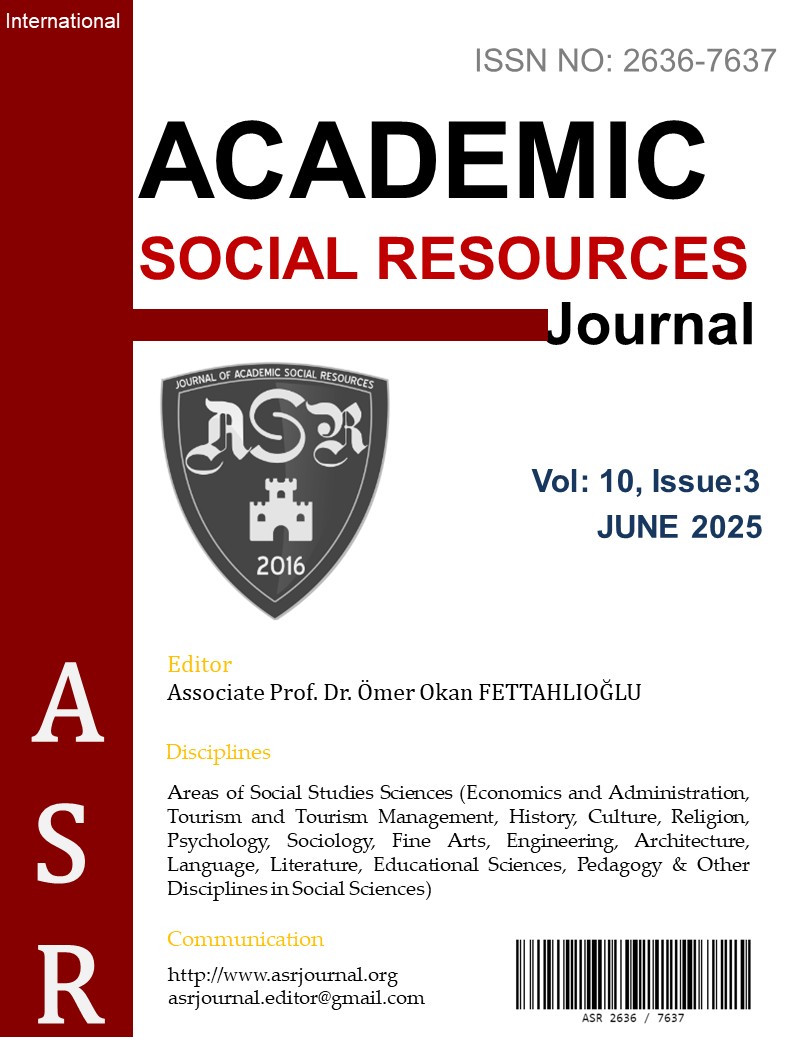Author :
Abstract
Tasavvufî hâller arasında sayılan gaybet ve huzûr, mürîdin anlam arayışı ve mânevî tekâmül sürecinde önemli duraklar olarak kabul edilmektedir. Bu iki hâlden her biri mürîdin Allah’a yakınlaşma yolculuğunda tecrübe ettiği farklı bilinç durumlarını ifade eder. Gaybet, tasavvufî literatürde, mürîdin duyularının ve bilincinin geçici olarak yok olduğu, sadece Allah’ın varlığıyla birleştiği bir hâl olarak tanımlanır. Bu durumda mürîd benliğinden ve mâsivâdan tamamen soyutlanarak yalnızca ilahi varlıkla bütünleşir. Huzûr ise, insanın kalp, ruh ve zihninin Allah’ın huzûrunda tam anlamıyla varlık bulduğu bir durumdur. Bu hâl, fiziksel varlık değil, bireyin ruhsal ve zihinsel olarak Allah ile derin bir bağ kurduğu bir olgunluk durumudur. Tasavvufî yolculukta huzûr, dünyevi kaygılardan arınarak manevi bir olgunlaşma ve nihai hedef olarak kabul edilir. Bu makale, tasavvufî tecrübenin temel dinamiklerinden olan gaybet ve huzûr kavramlarını derinlemesine incelemeyi amaçlamaktadır. Birbirini tamamlayan bu iki kavram, sâlikin manevî yolculuğunda önemli dönüm noktalarını temsil eder. Tasavvufî terimlerden gaybet ve huzûrun lügat ve ıstılah mânaları izah edilmekle birlikte ayet ve hadis referansları ve mâna açılımları üzerinde ayrıntılı bir inceleme yapılacaktır. Bu doğrultuda, ilgili ayetlerin özellikle işârî yorumları üzerinde durulacak ve bu yorumların kavramların tasavvufî anlam dünyasına katkıları değerlendirilecektir. Benzer şekilde, hadislerde söz konusu kavramların doğrudan veya dolaylı olarak nasıl ele alındığı ortaya konulacaktır. Ayrıca makalede tasavvuf geleneğinde, özellikle tasavvuf klasikleri üzerinde kaleme alınmış eserlerde, sûfîlerin gaybet ve huzûr kavramlarına dair yaklaşımları kapsamlı bir biçimde değerlendirilecektir. Tasavvufî literatürün önemli müelliflerinin, bu kavramlarla ilgili anlayışları ortaya konulacaktır.
Keywords
Abstract
The concepts of ghaybah (occultation) and huzur (presence) are considered important stages in the search for meaning and spiritual development in Sufism. Each of these states represents different levels of consciousness experienced by the seeker on their journey towards closeness to Allah. In Sufi literature, ghaybah is defined as state in which the seeker's senses and consciousness temporarily disappear, and they merge solely with the existence of Allah. In this state, the seeker is completely detached from their ego and worldly distractions, uniting only with the Divine presence. Huzur, on the other hand, refers to state where the heart, soul, and mind of the individual are fully present before Allah, experiencing His presence. This state is not about the physical existence but spiritual and mental condition where deep connection with Allah is established. On the Sufi path, huzur is considered state of spiritual maturity and purification, achieved by freeing oneself from worldly concerns, and it is seen as the ultimate goal. This article aims to explore the concepts ghaybah and huzûr, which are fundamental dynamics of the Sufi experience. These two interrelated concepts represent significant turning points in the spiritual journey of the seeker. The article will provide detailed explanation of both the linguistic and esoteric meanings of these Sufi terms, supported by references to Quranic verses and Hadiths, along with their deeper interpretations. The focus will be on the interpretative exegesis of relevant verses, particularly their allusive meanings, and how these interpretations contribute to the Sufi understanding of the concepts. Similarly, the article will examine how these concepts are addressed directly or indirectly in the Hadiths. Additionally, the article will evaluate the approaches of Sufis toward ghaybah and huzur as discussed in Sufi classical works. It will present the understanding of these concepts by major figures in Sufi literature.





